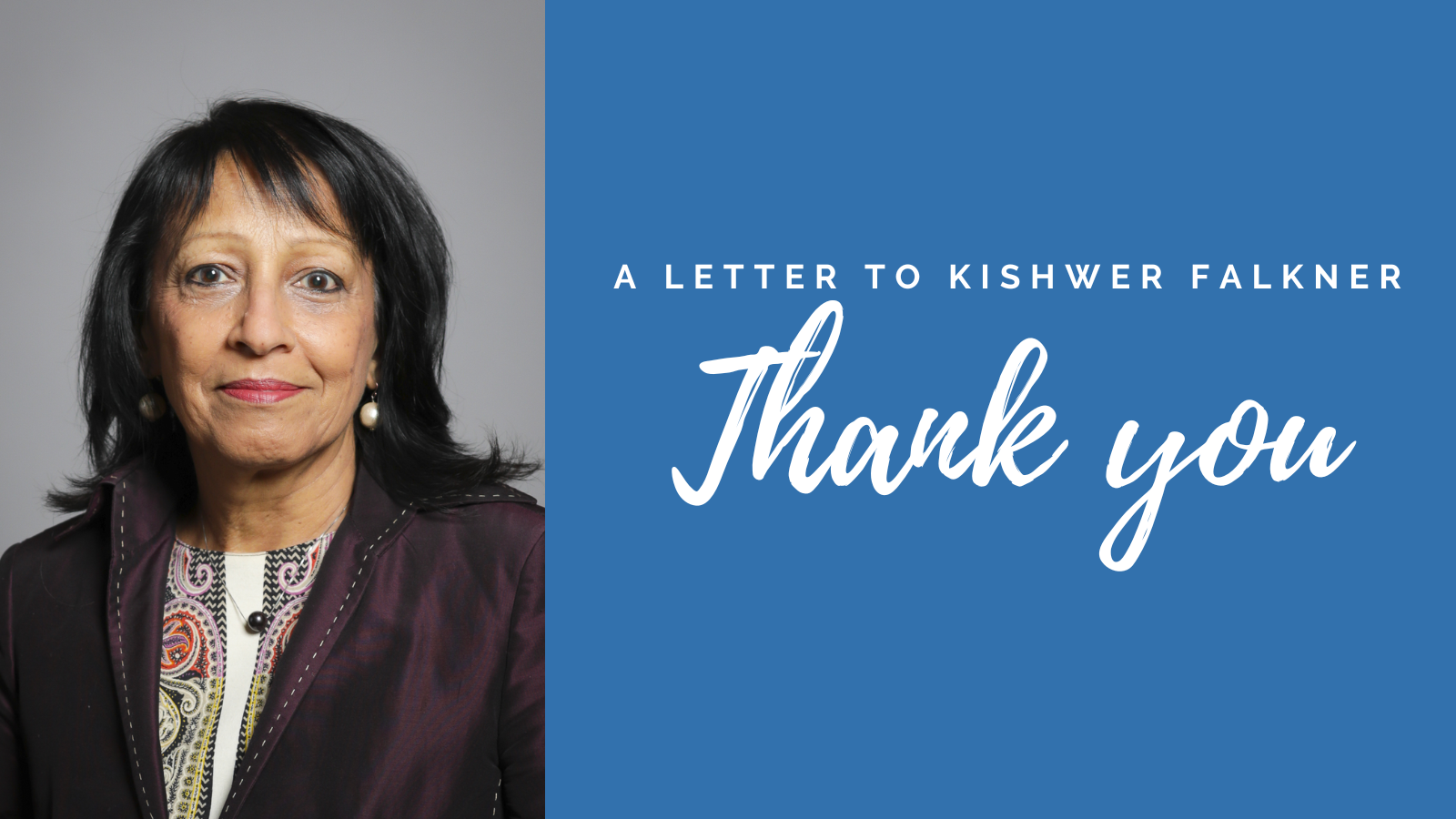Thank you, Kishwer Falkner

We have written to Baroness Kishwer Falkner, Chair of the Equality and Human Rights Commission:
Dear Kishwer Falkner
Thank you for publishing your letter to the Minister for Women and Equalities setting out, with careful reasoning, why you support revisiting and clarifying the meaning of “sex” as a protected characteristic in the Equality Act.
We are sorry that you have been subjected to abuse as a result. As you will know, this bullying is commonly experienced by anyone (but particularly women) who departs from simply affirming that “trans women are women”. You have our solidarity, support and admiration for your integrity, steadfast in this storm.
The treatment you have received is part of an international pattern of institutionalised discrimination and harassment of people who express “gender-critical” views. Last month in Auckland, campaigners for women’s rights were threatened, assaulted and prevented from speaking in public. We have seen women at a rally in Hyde Park facing a barrage of amplified abuse, and hate-filled protests outside the inaugural conference of the Lesbian Project in London. In the US, swimmer Riley Gaines was hit in the face and threatened by a mob. We have personally (Maya and Helen) sat quietly in a pub in Westminster while protesters gathered outside shouting “fascist” at us. The EHRC offices has had urine poured over its doors by a protester who exposed himself.
Our experience is that the impunity with which protesters threaten women and LGB campaigners is linked to a broad-based and frightening campaign to dehumanise us and portray us as outside the bounds of civilised society, and therefore as acceptable targets for any sort of attack. We are referred to as vile old hags, fascists, Nazis, and cockroaches that are infesting the public domain.
Our inboxes are full of messages from women and men who describe routine and explicit discrimination and harassment which they face at work or at the hands of public authorities, schools, universities, regulators and trade unions, because they have been labelled “TERFs”. While the Forstater judgment is having some impact, many still face hostility. This sort of discrimination would not be tolerated for a moment if it were directed at a group defined by any other protected characteristic. When groups are victimised, when slurs are used to describe them, when the police stand back from protecting them, and when elite opinion holds that they do not merit the normal courtesies and protections of civilised society, it is hardly surprising that a violent fringe feels encouraged to use violence against them.
We believe that clarifying the meaning of sex in the Equality Act in the UK is an important step to address this. Not only will it deal with the specific anomalies and issues you detail in your letter, but also, and perhaps even more importantly, it will clarify that biological women, as a group, are vulnerable to discrimination because of their sex, and that those setting public policy must consider the impacts of their decisions upon this group as well as others.
Speaking clearly about the distinction between being a woman, on the one hand, and being a man who identifies as a woman, on the other, is not hateful. Nor is collecting accurate data on the two sexes. Indeed, these distinctions are essential to understand impacts and protect everyone’s rights, and in particular those of vulnerable groups.
We welcome your recognition of competing rights. If any possibility of competing rights is dismissed, then women’s rights are, in effect, set at zero whenever the demands or interests of men who identify as women are raised.
As you may know (and we will be writing to Melanie Field with further details), we were shocked that, after attending an EHRC-sponsored event for civil-society organisations on 17th February at Birmingham City University Centre for Human Rights, we (together with LGB Alliance) were subjected to the same silencing treatment. The joint communiqué developed by participants at the event was vetoed because of our involvement. Project staff deleted a tweet that recognised our participation and told us they would not work with us in future. This is the polite use of the “heckler’s veto”, but has the same effect as those who scream in our faces and seek to intimidate us physically.
You are right when you say in your letter to the minister that there is an urgent need to move public debate on these issues to a more informed and constructive basis. This includes engagement with civil-society organisations. The BCU incident reveals that there is a gap waiting to be filled by organisations willing to hold space open for constructive discussion.
In 2018 the EHRC convened separate round tables with groups on both sides of this debate, and has continued to engage bilaterally. We would encourage you now to bring these conversations into the same room. We would welcome regular meetings bringing together civil-society organisations that respect everyone’s rights with the aim of discussing perspectives, and finding common ground and clarity about areas of disagreement. We think it is a reasonable minimum condition for any group wishing to be treated as part of civil society that it should be willing to engage in civil debate.
Yours sincerely
Maya Forstater
Executive Director,
Sex Matters
Helen Joyce
Director of Advocacy,
Sex Matters
Naomi Cunningham
Chair,
Sex Matters
